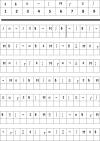Recommendations for a Brief International Cognitive Assessment for Multiple Sclerosis (BICAMS)
- PMID: 22190573
- PMCID: PMC3546642
- DOI: 10.1177/1352458511431076
Recommendations for a Brief International Cognitive Assessment for Multiple Sclerosis (BICAMS)
Abstract
Background: Cognitive impairment in MS impacts negatively on many patients at all disease stages and in all subtypes. Full clinical cognitive assessment is expensive, requiring expert staff and special equipment. Test versions and normative data are not available for all languages and cultures.
Objective: To recommend a brief cognitive assessment for multiple sclerosis (MS) that is optimized for small centers, with one or few staff members, who may not have neuropsychological training and constructed to maximize international use.
Methods: An expert committee of twelve members representing the main cultural groups that have so far contributed considerable data about MS cognitive dysfunction was convened. Following exhaustive literature review, peer-reviewed articles were selected to cover a broad spectrum of cultures and scales that targeted cognitive domains vulnerable to MS. Each was rated by two committee members and candidates scales were rated on psychometric qualities (reliability, validity, and sensitivity), international application, ease of administration, feasibility in the specified context, and acceptability to patients.
Results: The committee recommended the Symbol Digit Modalities Test, if only 5 minutes was available, with the addition of the California Verbal Learning Test - Second Edition and the Brief Visuospatial Memory Test - Revised learning trials if a further 10 minutes could be allocated for testing.
Conclusions: A brief cognitive assessment for MS has been recommended. A validation protocol has been prepared for language groups and validation studies have commenced.
Conflict of interest statement
Professor Langdon has received funding for travel to scientific meetings from Bayer Healthcare; serves on a Steering Committee for Bayer Healthcare; has served/serves as a consultant to Merck-Serono, Bayer Healthcare; served on speaker bureau for Bayer Healthcare, Roche, Serono Symposia, TEVA Germany; receives research contract funding from Bayer Healthcare; receives educational grants from Bayer Healthcare.
Professor Amato received personal compensation from Merck Serono, Biogen Dompè, Sanofi Aventis, Bayer Schering for serving on scientific advisory board and for speaking. Professor Amato received financial support for research activities from Merck Serono, Sanofi Aventis, Biogen Dompè, Bayer Schering.
Dr Boringa has consulted for Bayer Healthcare served on speaker bureau for Exencia Pharma Academy.
Dr Brochet serves on scientific advisory boards for Bayer Schering Pharma, Novartis, and Merck Serono; has received funding for travel and speaker honoraria from Bayer Schering Pharma, Merck Serono, Biogen Idec, AB Sciences, and Teva Pharmaceutical Industries Ltd./Sanofi-Aventis; and serves as LEN editor for SEP et Neurosciences.
Dr Foley has received honoraria for speaking at scientific and patient-education meetings, serving on scientific advisory boards and consulting activities from Bayer–Schering, Biogen, and Teva Neuroscience.
Dr Fredrikson has received honoraria for lectures, educational activities and consultancy from Bayer, Biogen Idec and Sanofi–Aventis during the past year.
Dr Hämäläinen received personal compensation from Bayer Healthcare and Novartis for serving on scientific advisory boards; consulting for Sanofi–Aventis; served on speaker bureau for Bayer Healthcare and Sanofi–Aventis.
Professor Hartung received honoraria with approval by the Rector of Heinrich-Heine-University from Bayer Healthcare GmbH, Octapharma GmbH, Novartis, Teva Sanofi Aventis, Biogen Idec GmbH and Merck Serono GmBH for consulting and speaking at scientific symposia.
Dr Krupp has served on speaker bureaux, scientific advisory boards and/or been a consultant for Teva Neurosciences, BiogenIdec, EMD Serono, Multiple Sclerosis Association of America, Betaseron/Bayer Healthcare Pharmaceuticals, Pfizer, Sanofi–Aventis, Axon Advisors; she has received royalties from Genzyme, ER Squibb & Sons, NMSS, Novartis, MedImmune, Abbott Laboratories, Johnson&Johnson, Roche, Health Professions Conferencing Corp.
Dr Penner has received honoraria for speaking at scientific meetings, serving at scientific advisory boards and consulting activities from Bayer–Schering, Biogen, Merck Serono, Roche, Novartis.
Dr Reder has recently submitted two articles to
Professor Benedict has acted as a consultant or scientific advisory board member for Bayer, Biogen Idec, Merk Serono, EMD Serono, Pfizer, Novartis; royalties from Psychological Assessment Resources, Inc; financial support for research activities from Shire Pharmaceuticals, Biogen Idec.
Figures
References
-
- Langdon DW. Cognition in multiple sclerosis. Curr Opin Neurol 2011; 24: 244–249 - PubMed
-
- Amato MP, Portaccio E, Goretti B, et al. Relevance of cognitive deterioration in early relapsing–remitting MS: a 3-year follow-up study. Mult Scler 2010; 16: 1474–1482 - PubMed
-
- Amato MP, Portaccio E, Stromillo ML, et al. Cognitive assessment and quantitative magnetic resonance metrics can help to identify benign multiple sclerosis. Neurology 2008; 71: 632–638 - PubMed
-
- Langdon D. Cognitive impairment in multiple sclerosis – recent advances and future prospects. Eur Neurol Rev 2010; 5: 69–72
Publication types
MeSH terms
LinkOut - more resources
Full Text Sources
Other Literature Sources
Medical




